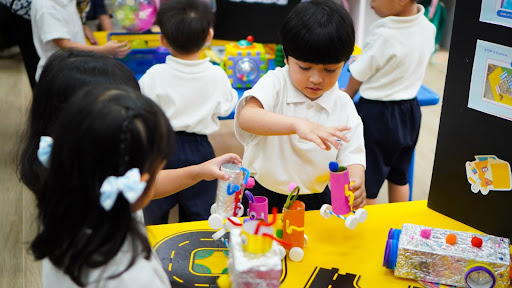In today's digital age, it is more important than ever to prioritize digital safety and well-being. With the rise of technology and the internet, people of all ages spend more time online than ever before.
While the internet offers many benefits, it also presents a range of potential risks and dangers, such as cyberbullying, online scams, and identity theft. As such, it is essential to understand how to navigate the online world safely and responsibly.
One institution that recognizes the importance of digital safety and well-being is Sampoerna Academy, an international school in Indonesia. Sampoerna Academy places a strong emphasis on digital literacy and offers a range of programs to promote responsible digital citizenship among its students.
In this article, we will explore five ways to navigate the online world safely and responsibly, drawing on best practices and tips from Sampoerna Academy and other reputable sources.





What is Digital Citizenship
Digital citizenship is an increasingly important topic in today's digital age. As technology becomes more integrated into our daily lives, it is essential to understand how to navigate the digital world safely and responsibly. So, what exactly is digital citizenship? According to Common Sense Media, a nonprofit organization dedicated to promoting safe technology and media for children, digital citizenship refers to the responsible use of technology and digital media. It encompasses a range of skills, such as online safety, privacy, security, digital literacy, and responsible online behavior. The International Society for Technology in Education (ISTE) is another organization that supports the use of technology in education. According to ISTE, digital citizenship refers to the norms of appropriate, responsible technology use. It involves a range of skills, such as understanding online privacy, avoiding cyberbullying, and managing digital footprints. Both Common Sense Media and ISTE agree that promoting digital citizenship is crucial to helping individuals develop the necessary skills and knowledge to navigate the digital world safely and ethically. Sampoerna Academy recognizes the significance of promoting digital citizenship and has integrated digital literacy education into its curriculum. By teaching students about digital citizenship, Sampoerna Academy can prepare them for a world where technology plays a significant role in both their personal and professional lives. Digital citizenship is a critical component of modern education, as it helps individuals become responsible and ethical digital citizens while also contributing to a safer, more positive online community.
5 Ways to Navigate Through the Online World
Here are five ways to navigate the online world safely and responsibly:-
Be mindful of your digital footprint
-
Use strong passwords and two-factor authentication
-
Be cautious of online scams and phishing
-
Limit your screen time
-
Seek help if you experience cyberbullying or online harassment

Simple ways to promote digital safety and well-being for students
As technology and the internet continue to play a significant role in our lives, it's crucial to prioritize digital safety and well-being, especially for students. Young people are particularly vulnerable to the risks associated with the online world, including cyberbullying, social media addiction, and online predators. Therefore, it's essential to educate them on how to navigate the online world safely and promote healthy digital habits. Here are some simple ways to promote digital safety and well-being for students. Create a safe and open dialogue One of the best ways to promote digital safety and well-being is by creating a safe and open dialogue with students. Encourage them to talk about their online experiences and concerns, and provide them with a safe space to share their thoughts and feelings. By fostering an environment of open communication, students can feel more comfortable seeking help if they encounter any issues online. Teaching responsible social media to use Social media can be a powerful tool for communication and connection, but it can also be a source of stress and anxiety. Educate students on responsible social media use, including the impact of oversharing personal information and the importance of privacy settings. Encourage them to take regular breaks from social media and be mindful of the content they consume. Encourage healthy digital habits Excessive screen time can have negative impacts on mental and physical well-being. Encourage students to adopt healthy digital habits, such as taking regular breaks from technology, engaging in physical activity, and spending time outdoors. Additionally, educate them on the importance of getting enough sleep and limiting screen time before bedtime.
How Sampoerna Academy prepares students to interact successfully online
Sampoerna Academy, an international school in Indonesia, is dedicated to preparing students to interact successfully online. With a focus on digital safety and well-being, the school provides students with the necessary tools and education to navigate the online world safely. Here's how Sampoerna Academy prepares students to interact successfully online. Digital citizenship education Sampoerna Academy emphasizes the importance of digital citizenship education, which teaches students how to use technology and the internet responsibly. Through digital citizenship education, students learn about cyberbullying, online privacy, and responsible social media use. By developing these skills, students can navigate the online world with confidence and make responsible decisions online. Safe and supportive learning environment Sampoerna Academy provides a safe and supportive learning environment for students. By fostering a culture of respect and inclusivity, students feel more comfortable seeking help and support if they encounter any issues online. The school also has a zero-tolerance policy for cyberbullying and takes swift action to address any incidents. Parent education Sampoerna Academy recognizes that promoting digital safety and well-being requires a collaborative effort between parents and educators. Therefore, the school provides the parent with education on digital safety and well-being, including how to monitor and support their child's online activities. By working together, parents and educators can create a safe and supportive digital environment for students. In conclusion, promoting digital safety and well-being is essential for students in the digital age. By creating a safe and open dialogue, teaching responsible social media use, encouraging healthy digital habits, and providing education on digital citizenship, Sampoerna Academy can prepare students to interact successfully online. As technology continues to play a significant role in our daily lives, it is essential to prepare the next generation to navigate the digital world safely and responsibly. Sampoerna Academy is committed to promoting digital safety and well-being through its innovative curriculum that integrates digital literacy education into all aspects of learning. By enrolling your child in Sampoerna Academy, you can ensure that they receive a comprehensive education that prepares them to become responsible digital citizens and successful leaders in the 21st century. Join the Sampoerna Academy community today and give your child the tools they need to succeed in the digital age. Source:- Common Sense Media. (n.d.). Digital citizenship. Common Sense Education.
- International Society for Technology in Education. (2017). ISTE Standards for students. ISTE.


